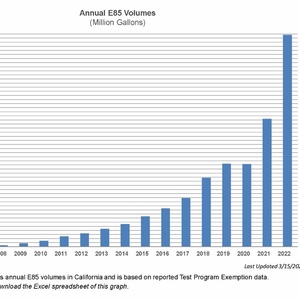RFA: California E85 sales skyrocket past 100M gallons in 2022

March 16, 2023
BY Renewable Fuels Association
Sales of E85 flex fuel in California in 2022 surged 66 percent over 2021 and more than doubled the pre-pandemic record set in 2019, new data released by the California Air Resources Board indicate. Last year, California drivers purchased over 103.5 million gallons (mg) of E85 flex fuel, a blend containing up to 85 percent ethanol and 15 percent gasoline, for use in flex-fuel vehicles (FFVs). That’s up from about 62.5 mg in 2021.
California is one of just a handful of states that reports annual E85 sales volumes. Renewable Fuels Association President and CEO Geoff Cooper said the Golden State continues to lead the way when it comes to offering lower-carbon, lower-cost liquid fuels to consumers.
“Gas prices remain at elevated levels in California, and drivers are seeking out options at the pump that are both more affordable and better for the environment,” Cooper said. “E85 checks both of those boxes. E85 substantially reduces greenhouse gas emissions compared to gasoline, and the fuel typically sells for 25 to 40 percent less in California. This new data show that when E85 is made available and effectively promoted, FFV drivers will absolutely respond.”
Cooper noted that the surge in E85 sales in California is due to a combination of factors. “These results show what is possible when policies like the California Low Carbon Fuel Standard and federal Renewable Fuel Standard are combined with smart promotional and marketing campaigns,” he said. “The California E85 experience should serve as a model for other states to emulate.”
Advertisement
Data from the California Energy Commission, to be updated next month for 2022, show that at the end of 2021 there were more than 1.2 million flex-fuel vehicles on California’s roadways.
Advertisement
Related Stories
Iowa farmers have a new market opportunity for their 2025 soybean crop. Landus is expanding its Clean Fuel Regulation initiative, made possible by recent policy changes expected to increase Canada's demand for liquid biofuel.
Topsoe, a leading global provider of advanced technology and solutions for the energy transition, has been selected as the renewable diesel technology partner for CountryMark’s Mount Vernon, Indiana refinery.
Klobuchar, Moran introduce bipartisan legislation to support biorefineries, renewable chemicals, and biomanufacturing
Sens. Amy Klobuchar, D-Minn., and Jerry Moran, R-Kan., on July 31 announced the introduction of the Ag BIO Act. The legislation aims to update the USDA’s loan guarantee program to better support biorefining projects.
The U.S. exported 35,953.6 metric tons biodiesel and biodiesel blends of B30 or greater, according to data released by the USDA Foreign Agricultural Service on Aug. 5. Biodiesel imports were at 2,148.9 metric tons for the month.
XCF Global leverages Alfa Laval technology to enhance pretreatment capabilities at New Rise Reno facility
XCF Global Inc. on Aug. 5announced it leverages Alfa Laval Inc. pretreatment technology at its New Rise Reno biorefinery, a sustainable aviation fuel (SAF) plant located in Nevada. The pretreatment technology enhances feedstock flexibility at the plant.
Upcoming Events










